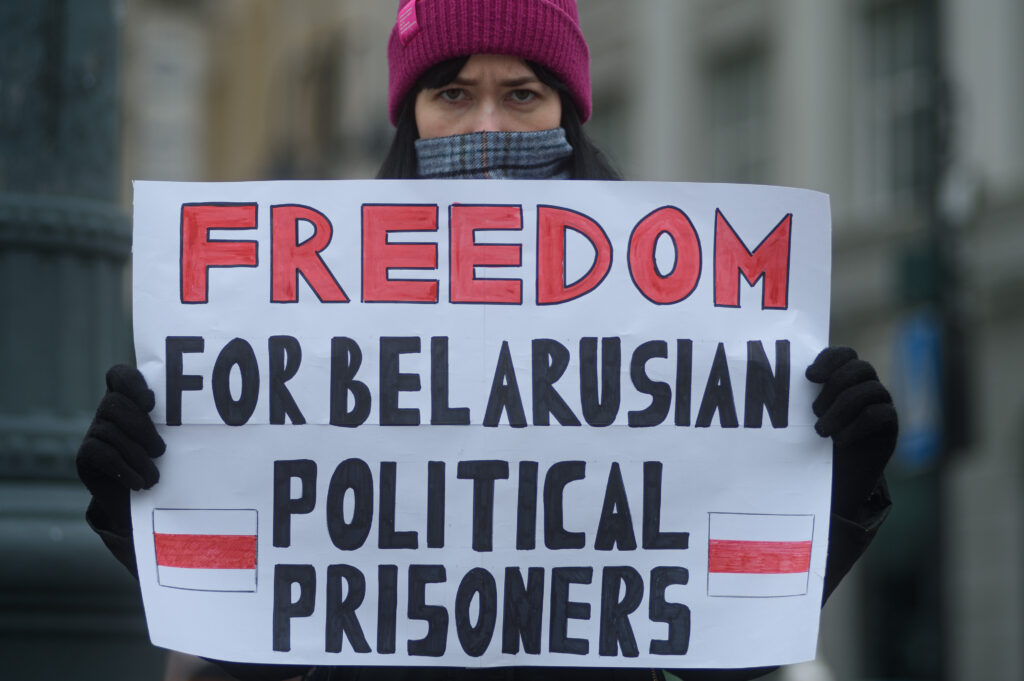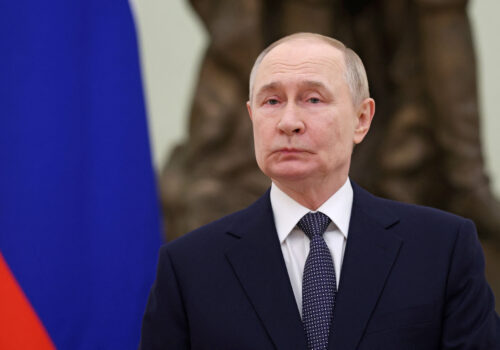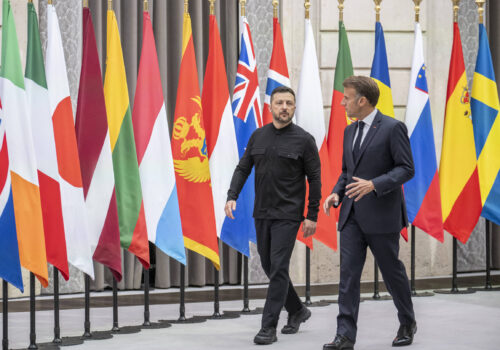On October 2, 2020, Belarusian human rights defender Andrei Chapiuk was arrested as part of a sweeping crackdown on the country’s civil society following mass protests in the wake of a presidential election that was widely considered fraudulent. Chapiuk is a volunteer for the Belarusian NGO Viasna, one of many civil society organizations specifically targeted by the Belarusian authorities and falsely accused of orchestrating mass demonstrations against Belarusian dictator Alyaksandr Lukashenka. Like many Viasna staff and volunteers, Chapiuk faced trumped up charges and was tried in a closed session of the Minsk Municipal Court. He received a fine and a six-year sentence. In April 2025, Chapiuk was released.
More than 1000 political prisoners remain behind bars in Belarus, including other Viasna staff and volunteers such as Ales Bialiatski, Uladzimir Labkovich, Valiantsin Stefanovic, and Nasta Loika. Viasna volunteer service coordinator Marfa Rabkova was arrested two weeks before Chapiuk and is also still in prison. The UN Special Rapporteur monitoring human rights in Belarus has consistently called on the Belarusian authorities to cease the persecution of human rights defenders and others in retaliation for their legitimate exercise of civil and political rights.
This month marks five years since Chapiuk was imprisoned. From exile, Chapiuk spoke to Human Rights House Foundation to discuss life after prison in a new country and reflect on the realities facing his colleagues still behind bars. When asked about life following his release, Chapiuk says the impact of prison is only truly understood once a person is free. “Everything surfaces, the whole experience of imprisonment. It’s like the body finally feels it can release everything that’s been piling up.”
Freedom, Chapiuk argues, brings a painful clarity to what has been taken away. “Six months, one year, then three; those numbers felt oddly insignificant because you were always surrounded by people who had served longer. Once you’re free, you realize how long that time really is.”
Chapiuk remains deeply concerned for his friends and colleagues who are still unjustly imprisoned, such as Marfa Rabkova. “Masha has missed so much over this period, left so much behind. There are health problems, too. I think it will feel even heavier when she’s released.”
The longer you’ve been inside, says Chapiuk, the harder it is to adjust to the new realities of freedom. “You step out into a world you last saw during COVID. People in masks. Now there’s a war. Belarus feels emptier. Technology has leapt ahead and you’re supposed to just jump right back in.” The arrival of artificial intelligence especially struck him. “In prison, we heard rumors. Once free, I was amazed at how cohesive and powerful these tools are.”
Stay updated
As the world watches the Russian invasion of Ukraine unfold, UkraineAlert delivers the best Atlantic Council expert insight and analysis on Ukraine twice a week directly to your inbox.
Chapiuk says that political prisoners in Belarus now face restricted access to books and education. “When I arrived in 2023, inmates could still apply for secondary education. Months later, the authorities cut it off entirely, especially for those of us on the extremism list. Then they started confiscating foreign language books, even personal ones.”
The confiscation of books is used as a form of punishment. “People tried hiding their own books but staff still found and confiscated them. The mindset in the system is that prisoners must suffer constantly. And since political prisoners tend to value books and education, the system decided to eliminate those.”
While discussing what life might have been like if he had not been arrested in 2020, Chapiuk is adamant that there really was no alternative. “Historically in Belarus, after civic activity, repression follows. I expected something to happen after the 2020 protests, but not the scale. Given the situation in Belarus, I’d likely have ended up either imprisoned or forced into exile anyway.”
On the subject of exile, we discuss Chapiuk’s decision to leave Belarus after his release. Faced with constant harassment and the likelihood of rearrest, he felt that fleeing Belarus was the only option. “The police presence in Belarus is constant. Former prisoners are subjected to mandatory check-ins twice a month, weekly lectures, and home visits, often late at night with flashlights in your face.”
Eurasia Center events

In early 2022, news of Russia’s full-scale invasion of Ukraine reached Belarusian inmates via state media. “Only later did I learn the truth about occupied cities and mass casualties. There was constant fear that Belarus would be dragged in and that we prisoners would be used as cannon fodder,” Chapiuk recalls. He says that even the prison guards seemed unsettled, secretly following independent news sources and perhaps worrying about what role they might be forced to play should Belarus enter the war.
International attention has become a complex issue for Belarusian political prisoners in recent years. Relatives of prisoners often ask human rights organizations not to make posts marking detention anniversaries or birthdays, as such attention can lead to reprisals inside prison. At the same time, Chapiuk argues that media coverage can make a difference. “After reports of abuse, inspectors arrive at colonies or jails. Prisons often hide people in punishment cells, but overall, high-profile prisoners are sometimes mistreated less to avoid trouble.”
Chapiuk emphasizes the importance of keeping the health of political prisoners high on the agenda. “The more medical units are checked, the more violations are documented, the better for inmates in the long run. Prison healthcare is terrible everywhere.”
Letters were once a lifeline for political prisoners in Belarus but are now heavily censored, says Chapiuk. Nevertheless, he urges people not to give up and to continue writing. “Even if letters don’t reach us, the authorities see the activity. It shows we’re not forgotten.”
The families of political prisoners also face pressure and can be targeted by the Belarusian authorities. Chapiuk recalls the case of one co-defendant’s mother who was given a prison sentence for simply sharing information about her son. “The state has built a second ring of repression to cut off information flows.”
Chapiuk is deeply troubled by the idea that the suffering of Belarusians will be forgotten and that no one will be held accountable for the years of abuse, despite the extensive documentation of human rights violations by Belarusian civil society. Recent prisoner releases have given him hope, despite the fact that these releases have often been followed by forced exile. “It would be better if people were freed earlier, not just at the end of their terms. But still, each release matters. It means someone can finally live freely again and feel what freedom really is.”
Craig Jackson is senior communications officer at the Human Rights House Foundation.
Further reading
The views expressed in UkraineAlert are solely those of the authors and do not necessarily reflect the views of the Atlantic Council, its staff, or its supporters.

The Eurasia Center’s mission is to enhance transatlantic cooperation in promoting stability, democratic values, and prosperity in Eurasia, from Eastern Europe and Turkey in the West to the Caucasus, Russia, and Central Asia in the East.
Follow us on social media
and support our work
Image: Yauhen Yerchak / SOPA Images via Reuters Connect





